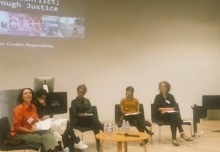The Victorian Ombudsman has observed that people detained in custody in Victoria face a greater risk of harm than at any time in the past decade. Against this context, the need for accountability for what takes place in Victorian prisons is greater than ever, to ensure that people are kept safe by those entrusted with their care. But a new bill set to pass the Victorian Legislative Council today will restrict public accountability of state and private prisons for deaths and serious injuries sustained behind the closed doors of a prison that arise from a prison operator’s negligence.
If passed, the Wrongs Amendment (Prisoner Related Compensation) Bill 2015, will restrict the amount of compensation a person with a criminal record can receive for psychiatric injury sustained as a result of their family member being injured or dying in prison. This is a gross injustice. The State owes a duty of care to ensure the safety of people in their custody in Victorian prisons. Victorian prisoners have a right to be treated humanely while in the custody and care of the Sate and not to be arbitrarily deprived of their life. Their families have a right to expect this. Commenting on the bill, barrister Greg Barns says “if a relative has a loved one unlawfully killed or seriously injured in prison and they are impacted adversely, the law should protect them.” This bill does the opposite.
Couched as a bill to prevent Roberta Williams receiving compensation for the murder of her husband, Carl Williams, if passed the Act may have much wider ramifications. For example, if a prisoner is seriously injured or killed in prison by another prisoner as a result of prison operator’s negligence (be it a private contractor or the State) this bill may render a claim by any family members who sustain psychiatric injury as a result, futile. Arguably, the bill, which is ambiguously worded, may also render the claims of prisoners who are themselves injured through the unlawful actions of prison operators and who suffer mental harm as a result, futile.
The bill prescribes that if a claimant has been convicted of ‘profit motivated’ offence (at any time in their history), any damages awarded to them by the Court for non-economic loss arising from mental harm, must be reduced by at least 90 per cent. If the claimant has been convicted of offences outside this category, damages must still be reduced, but to a discretionary sum of up to 100%, taking into account, amongst other factors, the claimant’s criminal history and the claimant’s character, behaviour or attitude before, during or after their conviction of a criminal offence. If a judge or jury reduces the amount of damages to be awarded by 100%, the claim will be defeated. Although it appears the bill is directed at relatives of prisoners who are injured or killed, it arguably does not preclude the compensation reducing provisions applying to prisoners who are themselves, harmed through unlawful conduct of prison operators.
Clearly, this bill will have flow on impacts far greater than defeating the Williams family’s compensation claim. Fundamentally, it is about diminishing the accountability of our prisons for the perpetration of intentional harms and acts of prisoner operator negligence that cause mental harm. For this reason, should not be passed.
Whether you are serving a term of imprisonment for life, or a term of imprisonment of 2 months, you are entitled to be kept safe from harm and negligence whilst you are in the custody of the State and your loved ones are entitled to demand accountability and when you are injured or killed in the state’s care. This act is designed to silence accountability through one of the few mechanisms incarcerated people and their families can use to hold the State and private prison operators to account for negligence and intentional acts that cause mental harm: civil litigation. This bill is an attempt to strangle this critical avenue for redress and will probably succeed because its aim is an easy political target – the criminalised.
So what does it mean for accountability of our prisons? It means that if a young person dies in custody through the negligence of the State government, their mother, if convicted of a criminal offence 20 years ago, would have any compensation awarded to her mandatorily reduced, by up to 100%.
Let’s place the risk of injury to prisoners in context. In March last year, the Victorian Ombudsman found that prisoners are “placed in overcrowded and at times substandard conditions leading to increasing tensions and violence” and that “the likelihood of prisoners being physically or sexually assaulted or self-harming leading to deaths is greater now than at any time in recent years.” Let’s also think about the profile of the current prison population. We know that people with acquired brain injury and intellectual disabilities are overrepresented in the Victorian prisoner population as are other vulnerable groups including victims of sexual assault. According to the Victorian Ombudsman “nearly 43 per cent of all male prisoners sentenced by a court in 2010- 11, received a sentence of less than six months. A further 30 per cent received sentences between six and 12 months.”
Dealing with our community’s mentally ill and intellectually disabled through incarceration, isn’t good enough.
The Victorian Government has already embedded discrimination against criminalised people into our laws. Changes to the Corrections Act in 2008 quarantines compensation prisoners receive for 12months and broadcasts the compensation to the world at large to enable claims to be made against the fund by debtors for debts unrelated to the act that gave rise to the obligation to compensate the prisoner. This is yet another measure designed to ensure that once you have committed a criminal offence, you will punished long after you have served your time. For a Government that professes it believes in rehabilitation, this bill only serves to undermine its own cause.
That this legislation is being enacted at the same time the Victorian Government is carrying out its 8 year Charter Review, only undermines our State’s commitment to human rights. All people’s human rights deserve protection, including the prisoners and their families. This legislation undermines this core principal and the rule of law. If we believe in human rights for all and not just for some, this bill should not be passed.
 Sophie Ellis,
Sophie Ellis,
Policy Accountability Project Lawyer




